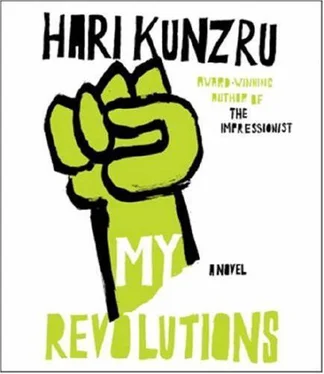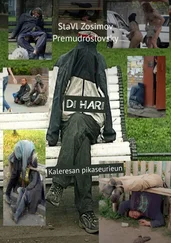“I think I’m beginning to.”
“Bountessence has to be — it has to be put on a more professional footing. And you’ve got to admit you don’t have the business background.”
“I don’t want the fucking business background.”
“Exactly. And, besides, I’m not sure it would be appropriate for either of us. Going forward, I mean.”
“Going forward?” I made sarcastic little quote marks with my fingers, which she ignored, doggedly carrying on with her speech.
“To work together, I mean. Things are strained enough as they are. I’m not sure I could — what I’m saying is I think you need something. Something of your own. A project.”
“So what do you reckon I should do, darling? Take up crocheting?”
“God, you’re impossible! I just meant — well, there’s nothing to stop you from getting a part-time job, is there?”
I walked out of the room before I said anything I’d really regret. And once I’d calmed down, two or three days later, I realized she was right. Anything was better than festering away in the house, obsessing about Anna Addison. Miranda didn’t want me around Bountessence and I didn’t want to be there either. There was, as she put it, nothing to stop me. So I followed the path of educated misfits through the ages and got a job in a bookshop.
Pelham Antiquarian Books is a refuge of slackness in the economically efficient high-street hell of our little market town. Specializing in nothing in particular it has, over the years, turned
into a dusty cavern of yellowing paperbacks, a place where books go to die. It’s run (slowly, into the ground) by Godfrey Kerr, an elderly alcoholic who doesn’t seem to give a toss whether he makes any money or not, as long as no one disturbs him before eleven or asks if he has anything by Jeffrey Archer.
I’d known God slightly for years, reached the stage where he’d grunt at me and perhaps raise his coffee cup when I came through the door. I’d always liked going into Pelham’s, with its moth-eaten rugs and rickety shelves, its odor of cat piss and intellectual decay. As the old town-center tradesmen have gone out of business, butchers and ironmongers and family-run tea rooms edged out by branches of Starbucks and Pizza Hut, it’s one of the last places you can pass the time without feeling you’re in some sort of wipe-clean playpen for the consuming classes. When I spotted God’s discreet card in the window, advertising for an assistant, I knew it would be the perfect bolt-hole.
Soon I was the one drinking coffee behind the counter and playing with Stearns, the elderly ginger cat. I went in even when I wasn’t needed, when God wasn’t too busy drinking himself to death in his “parlor” to come downstairs and open the shop. I spent a lot of time rummaging in the cardboard boxes stacked chest-high in the basement, pulling out buried treasures to read in the broken-down armchair in the back room. I hadn’t the faintest idea why God thought he needed an assistant. There wasn’t any work to do. The atmosphere of genteel derangement reminded me of one of the places I’d worked when I first came back from Asia, the shop where I’d met Miranda. Avalon sold various kinds of new-age junk, crystal healing kits and dream diaries and cheap silver jewelry. It was run by a witchy woman called Olla, a refugee from Kristiana, whose life was plagued by omens and portents; several times a month she received supernatural word that it was temporarily dangerous for her to sell scented candles and tarot packs to the people of the town and disappeared, leaving me in charge. Miranda was a regular customer, buying books on herbalism, packets of potpourri, greetings cards. I was suspicious, unused to being back
and still half in hiding as I gingerly built up the paper trail around Michael Frame. I’d moved to Chichester almost at random, because of a picture postcard I came across at the monastery, which had made me feel homesick. So English, that segmented blue-and-green selection of views. Cathedral Close. The High Street . It turned out to be a stuffy little town, good to bury myself in. It was only when I started chatting to Miranda that I realized how lonely I was.
Olla and Avalon disappeared years ago, so long that when I first tried, I found it hard even to remember Olla’s name.
After twenty years without a cigarette I’d started smoking again. Stress, I suppose, though in part it was an infantile reaction to Miranda’s new order, which now encompassed a personal trainer called Lee, who took her running in the park and hung around our kitchen talking about her body-mass index. No cigarettes in the shop was one of God’s few rules, so every time I wanted one I had to go for a walk. I was smoking under the Market Cross, remembering the phone calls from Olla where she’d whisper instructions into the receiver, telling me to light a sprig of St. John’s Wort and not answer the door to any red-haired men, when I realized the well-dressed tourist who’d been walking up and down photographing the cathedral had turned in my direction and was doing a sort of theatrical double-take. I was wrapped up warmly against the November weather, in a thick coat with a hat pulled down low over my head. There was nothing to distinguish me from a hundred other middle-aged shoppers, which made it all the more disturbing that this man was now starting to walk toward me, smiling a familiar quizzical half-smile.
“Chris,” he said, in the tone of a man in the throes of pleasure. “Chris Carver.”
I felt sick. Ever since France, I’d been waiting for this. I didn’t know what shape it would take, didn’t know who it would be, but I knew there would be someone. I should have guessed. It was always Miles who signaled the changes.
“I’m sorry,” I said. “I think you’ve mistaken me for someone else.”
“I don’t believe so.”
“My name’s Michael. You’ve made a mistake.”
“Come off it, Chris. I know we’ve all changed, but not that much.”
He’d grown into himself, somehow. His hair, which had been fine and blond, was shaved close to his narrow skull. His glasses, which I remember as thick, black-framed things like old-fashioned TV sets, had slimmed down into tiny steel-rimmed rectangles. He was wearing an expensive-looking overcoat over a suit in a brash Rupert Bear check. As he examined me he shot his cuffs, showing off the cufflinks, two little enamel portraits of Elvis Presley. Evidently Miles Bridgeman was still the dedicated follower of fashion. It seemed unlikely that this man, with his aura of well-heeled cocaine abuse and lunches at West End clubs, just happened to be wandering around in Chichester at two on a Wednesday afternoon. Whatever lay behind this encounter, it wasn’t chance.
“Please, Miles,” I said, as gently as I could. “At least call me Mike. That’s my name now. Mike.”
All things are transitory. All things must pass. Attachments, whether to material possessions, to people, to places or a name, are futile. Despite your clinging, these things will fade away.
I first met Miles in the cells after Grosvenor Square, the same day I saw the girl I still believe was Anna. I’d begun that morning, listening to speeches in Trafalgar Square, as a fairly typical second-year student at the London School of Economics, which is to say I’d spent the previous eighteen months in an overheated coffee-bar argument about the best way to destroy the class system, combat state oppression and end the War. For us there was only one war. Even though we weren’t fighting there (one promise our so-called socialist government hadn’t broken), Vietnam defined us. It was Vietnam that drew us together and made us a movement. I was sometimes a little vague about who I included in the word “us,” but that Sunday it seemed clear. There were tens of thousands there, the famous and the unknown, gathered together in the name of peace and internationalism. We were the People. It was our day.
Читать дальше












